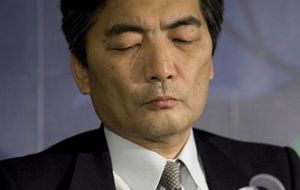MercoPress. South Atlantic News Agency
Top IMF official warns Asia to prepare for European developments’ consequences
 IMF Deputy Managing Director Naoyuki Shinohara in Singapore
IMF Deputy Managing Director Naoyuki Shinohara in Singapore Risks to the global economic outlook have “risen significantly” and policy makers have limited room to provide support to growth warned International Monetary Fund Deputy Managing Director Naoyuki Shinohara during a conference Wednesday in Singapore.
Most advanced economies are experiencing a “subdued” recovery, Shinohara said. “A key concern is that the room for continued policy support has become much more limited and has, in some cases, been exhausted”.
“Adverse developments in Europe could interrupt global trade with serious implications for Asia given its dependency of foreign demand”, added Shinohara.
Shinohara’s remarks come days after finance chiefs from the Group of 20 diverged on prescriptions for sustaining the global recovery. US Treasury Secretary Timothy F. Geithner called on Japan and European countries with trade surpluses to boost domestic demand, while Europe’s representatives said reining in budget deficits was the top priority.
As advanced economies suffer stunted recoveries, Asia will continue to lead the world economic rebound, according to Shinohara, the former top currency official at Japan’s Ministry of Finance. That brings its own challenges, with increasing capital inflows and the risk of overheating if policy makers fail to take “appropriate” action, he said.
“After nearly two years of global economic and financial upheaval, shockwaves are still being felt, as we have seen with recent developments in Europe and the resulting financial market volatility,” Shinohara said. “The global outlook remains unusually uncertain and downside risks have risen significantly.”
Asia’s rebound is outpacing the rest of the world as companies from Nissan Motor Co. to Taiwan Semiconductor Manufacturing Co. increase exports and domestic spending strengthens. Some of the region’s central banks have started to withdraw monetary stimulus to stem inflation and asset bubbles while others are reluctant to increase borrowing costs on concern the European debt crisis may thwart the global economic recovery.
Macroeconomic policies have “appropriately” begun to normalize and the “strong” fiscal position in most Asian economies provides them with the “space” to respond flexibly, Shinohara said. Still, Asian governments said last month public debt risks and “destabilizing” capital flows are among threats to the region’s recovery.
“Should the recovery continue as expected, Asia’s bright growth prospects, together with low interest rates in major economies, would likely attract more capital,” Shinohara said. “This could lead to risks of overheating in some economies if appropriate policy action is not taken. On the other hand, further increases in global risk aversion could see capital-flows change direction quickly.”
Group of 20 finance officials who gathered earlier this month signaled deeper concern about the economic and fiscal outlooks than when they last met in April. In a statement after their June 5 meeting, the finance chiefs promised to “safeguard recovery,” yet replaced an endorsement of budget stimulus with a pledge to pursue “credible, growth-friendly measures to deliver fiscal sustainability.”




Top Comments
Disclaimer & comment rulesCommenting for this story is now closed.
If you have a Facebook account, become a fan and comment on our Facebook Page!